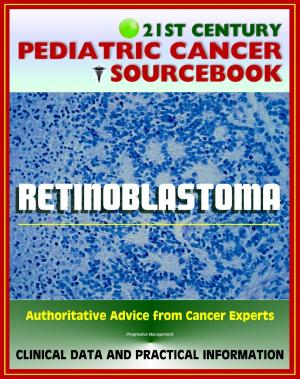21st Century Pediatric Cancer Sourcebook: Wilms Tumor (WT) and Other Childhood Kidney Tumors - Clinical Data for Patients, Families, and Physicians
Nonfiction, Health & Well Being, Health, Ailments & Diseases, Cancer| Author: | Progressive Management | ISBN: | 9781458033093 |
| Publisher: | Progressive Management | Publication: | March 1, 2011 |
| Imprint: | Smashwords Edition | Language: | English |
| Author: | Progressive Management |
| ISBN: | 9781458033093 |
| Publisher: | Progressive Management |
| Publication: | March 1, 2011 |
| Imprint: | Smashwords Edition |
| Language: | English |
Authoritative information and practical advice from the nation's cancer experts about childhood Wilms Tumor (WT) and other childhood kidney tumors, including nephroblastomatosis, clear cell sarcoma of the kidney, rhabdoid tumor of the kidney, neuroepithelial tumors of the kidney, nephroblastoma, renal cell carcinoma, congenital mesoblastic nephroma, primary renal synovial sarcoma, and anaplastic sarcoma of the kidney. Starting with the basics, and advancing to detailed patient-oriented and physician-quality information, this comprehensive compilation gives empowered patients, families, caregivers, nurses, and physicians the information they need to understand the diagnosis and treatment of this disease. In addition to disease-specific information, this ebook includes a glossary and information on the late effects of treatment for childhood cancer and pediatric supportive care. Wilms tumor and other childhood kidney tumors are diseases in which malignant (cancer) cells form in the tissues of the kidney. Having certain genetic syndromes or birth defects can increase the risk of developing Wilms tumor. Having certain conditions may be associated with renal cell carcinoma. Possible signs of Wilms tumor and other childhood kidney tumors include a lump in the abdomen and blood in the urine. Tests that examine the kidney and the blood are used to detect (find) Wilms tumor and other childhood kidney tumors. Wilms tumor and other childhood kidney tumors are usually diagnosed and removed in surgery. Certain factors affect prognosis (chance of recovery) and treatment options. Wilms tumor typically develops in otherwise healthy children; however, approximately 10% of children with Wilms tumor have a congenital anomaly. Children with Wilms tumor may have associated urinary tract anomalies, including hemihypertrophy, cryptorchidism, and hypospadias. Children may have a recognizable phenotypic syndrome (including overgrowth disease, aniridia, genetic malformations, and others).
Extensive supplements, with over forty chapters gathered from our Cancer Toolkit series and other reports, cover a broad range of cancer and health care topics useful to cancer patients. This edition includes our exclusive Guide to Leading Medical Websites with updated links to 81 of the best sites for medical information, which let you quickly check for updates from the government and the best commercial portals, news sites, reference/textbook/non-commercial portals, and health organizations. Supplemental coverage includes: Clinical Trials Background Information, Workbook; In-Depth Program; Clinical Trials at NIH; How To Find A Cancer Treatment Trial; Taking Part in Cancer Treatment Research Studies; Access to Investigational Drugs; Taking Time: Support for People with Cancer; Facing Forward - Life After Cancer Treatment; When Someone You Love Is Being Treated For Cancer; Living Beyond Cancer: Finding a New Balance; Caring for the Caregiver; Young People With Cancer, A Handbook For Parents; When Cancer Returns; When Someone You Love Has Advanced Cancer / Support for Caregivers; Chemotherapy; Managing Chemotherapy Side Effects; Follow-up Care After Cancer Treatment.
Authoritative information and practical advice from the nation's cancer experts about childhood Wilms Tumor (WT) and other childhood kidney tumors, including nephroblastomatosis, clear cell sarcoma of the kidney, rhabdoid tumor of the kidney, neuroepithelial tumors of the kidney, nephroblastoma, renal cell carcinoma, congenital mesoblastic nephroma, primary renal synovial sarcoma, and anaplastic sarcoma of the kidney. Starting with the basics, and advancing to detailed patient-oriented and physician-quality information, this comprehensive compilation gives empowered patients, families, caregivers, nurses, and physicians the information they need to understand the diagnosis and treatment of this disease. In addition to disease-specific information, this ebook includes a glossary and information on the late effects of treatment for childhood cancer and pediatric supportive care. Wilms tumor and other childhood kidney tumors are diseases in which malignant (cancer) cells form in the tissues of the kidney. Having certain genetic syndromes or birth defects can increase the risk of developing Wilms tumor. Having certain conditions may be associated with renal cell carcinoma. Possible signs of Wilms tumor and other childhood kidney tumors include a lump in the abdomen and blood in the urine. Tests that examine the kidney and the blood are used to detect (find) Wilms tumor and other childhood kidney tumors. Wilms tumor and other childhood kidney tumors are usually diagnosed and removed in surgery. Certain factors affect prognosis (chance of recovery) and treatment options. Wilms tumor typically develops in otherwise healthy children; however, approximately 10% of children with Wilms tumor have a congenital anomaly. Children with Wilms tumor may have associated urinary tract anomalies, including hemihypertrophy, cryptorchidism, and hypospadias. Children may have a recognizable phenotypic syndrome (including overgrowth disease, aniridia, genetic malformations, and others).
Extensive supplements, with over forty chapters gathered from our Cancer Toolkit series and other reports, cover a broad range of cancer and health care topics useful to cancer patients. This edition includes our exclusive Guide to Leading Medical Websites with updated links to 81 of the best sites for medical information, which let you quickly check for updates from the government and the best commercial portals, news sites, reference/textbook/non-commercial portals, and health organizations. Supplemental coverage includes: Clinical Trials Background Information, Workbook; In-Depth Program; Clinical Trials at NIH; How To Find A Cancer Treatment Trial; Taking Part in Cancer Treatment Research Studies; Access to Investigational Drugs; Taking Time: Support for People with Cancer; Facing Forward - Life After Cancer Treatment; When Someone You Love Is Being Treated For Cancer; Living Beyond Cancer: Finding a New Balance; Caring for the Caregiver; Young People With Cancer, A Handbook For Parents; When Cancer Returns; When Someone You Love Has Advanced Cancer / Support for Caregivers; Chemotherapy; Managing Chemotherapy Side Effects; Follow-up Care After Cancer Treatment.















